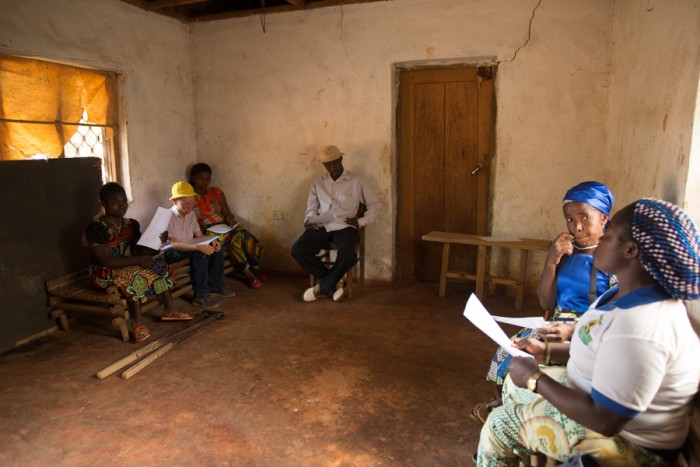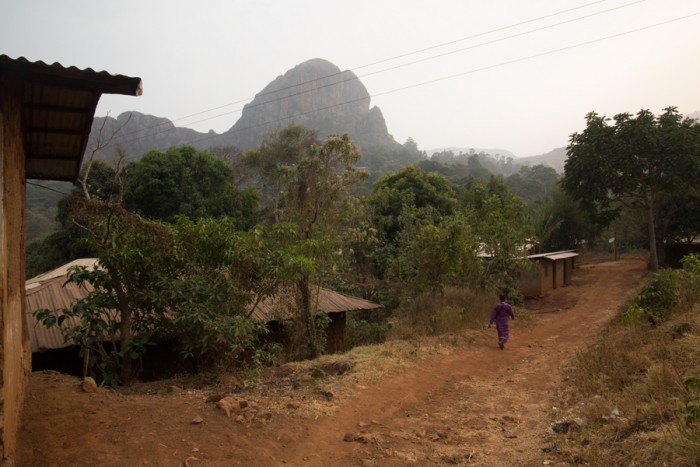March 9th, 2016 by Rachel | Tags: Peace Corps | No Comments »
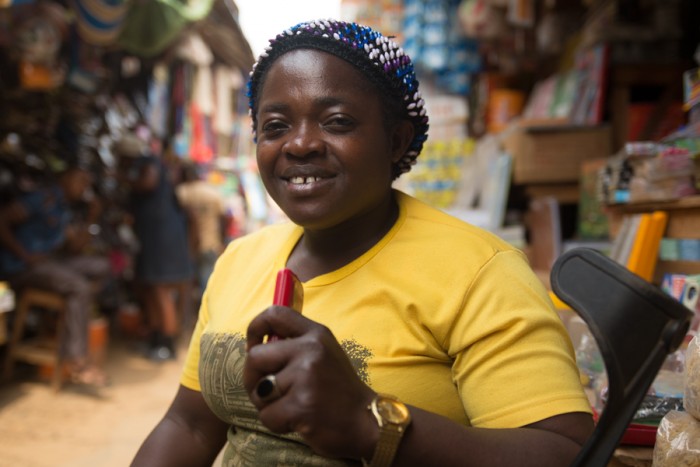
Ruth listens to the news relating to the US election on the radio that is on her phone.
Ruth and I were both sitting squashed in one seat in the front of a van. We were heading back to Bamenda from a long journey to a village for an HIV Prevention workshop a couple Sundays ago. “I heard that Hillary Clinton won Nevada!”
I turn to Ruth and look at her in shock, “How are you getting all the news about the US Election?”
“Radio,” she replied.
“So, the US Election is really covered here in Cameroon?”
“Yes,” she said.
Recently, I was talking to my landlord. He said, “I don’t like the Republicans. They believed in bombing Iraq. I don’t like Trump. He’s horrible. He’s banning Mexicans from entering the US. I like the Democrats. They’re good. They believe in healthcare.”
“How do you know so well about the US politics?” I asked.
“I watch CNN and BBC everyday,” he said.
Over the past several months, I have noticed how Cameroonians have really kept a close eye on the US politics. They know every name of candidates running for the Republican Party and also for the Democrat Party. They know which issues each candidates stand on. One of my work partners look up to the US politicians to the point that one of his children’s name is Dick Cheney. I did ask him why he named him after the former Vice President and he said it was simply because he admires the American leaders. There is also an aisle at a big market in Bamenda called Obama’s Line. The sign that says “Obama’s Line” also shows a painting of his face.

A few days ago, I asked another work partner why Cameroonians pay a very close attention to the US politics and she said, “It’s because the US political system is so flexible. We admire their system.”
March 8th, 2016 by Rachel | Tags: Disability, Peace Corps, Women | No Comments »
I marched in the parade with several other women with disabilities in Bamenda.
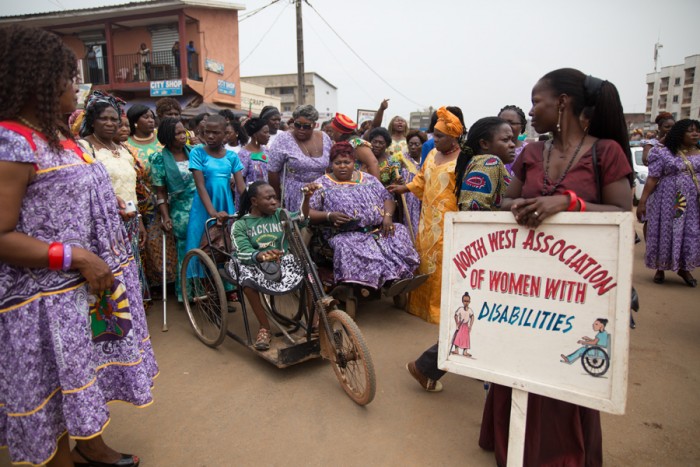
I would like to take an opportunity to review facts about women with disabilities in general and also about what women with disabilities face in Cameroon and also in other developing countries:
- Fifteen percent of all women in the world are women with disabilities. (WHO)
- Three-fourths of all persons with disabilities living in low- and middle-income countries are women with disabilities.
- Sixty-five to 70% of women with disabilities who live in low- and middle-income countries live in rural areas.
- Women in general are more likely than men to acquire disability because they face gender-based violence, work in poorer conditions and have limited access to healthcare. (UN)
- Seventy-five percent of women with disabilities are unemployed. (USAID)
- Women with disabilities face the challenge of preventing HIV because they are in increased risk for gender based violence and lack access to sexual reproductive health care services. (USAID)
- The global literacy rate for women with disabilities can be as low as 1%. (UN)
- The mortality rate for women with disabilities is higher than for men with disabilities. (APHA)
- There is a higher incidence of disabilities in conflict zones due to trauma and sexual violence. Refugee camps are often not accessible for women with disabilities – they struggle to get the amenities they need.
- Only 5% of women with disabilities are married while 50% of men with disabilities are married in Cameroon (Kiani).

I’d like to share these two pictures because I have never seen a woman ride a motorcycle in Cameroon until today. This woman sure did get lots of loud cheers!
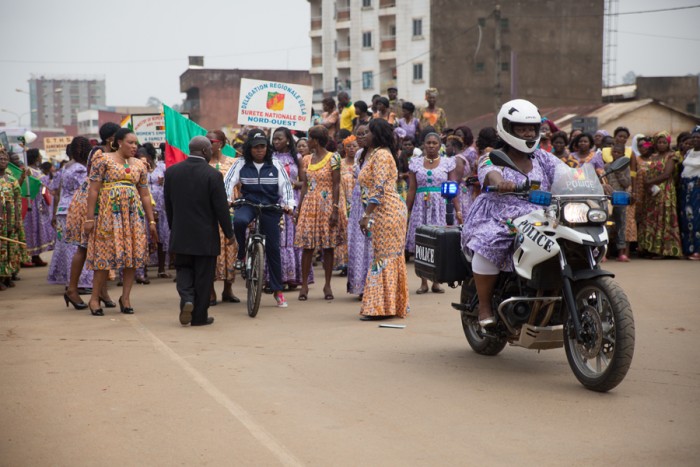
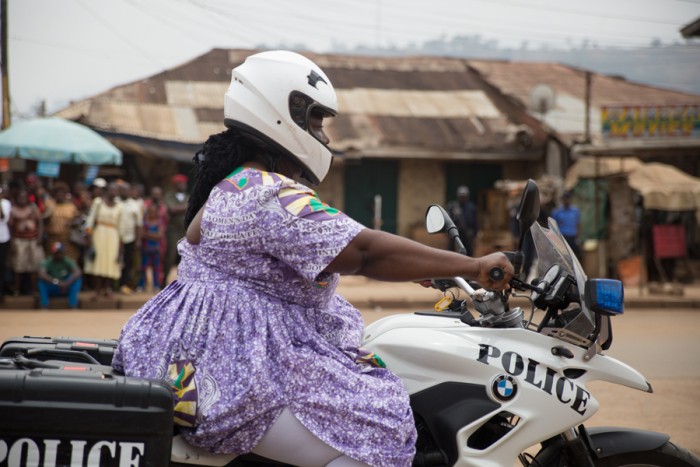
March 8th, 2016 by Rachel | Tags: Food, Peace Corps | No Comments »
I’ve been finding that it’s quite funny that people got riled up over Whole Food selling peeled oranges in plastic containers and accused other people of being lazy for peeling oranges.

Here in Cameroon, it’s an everyday scene to find peeled oranges sold on the streets everywhere. Cameroonians prefer to buy oranges that have already been peeled because they want to be able to eat them right away. The
only difference from the way Whole Foods sell them is that they’re not sold in plastic containers. Cameroonians normally eat the oranges as soon as they buy them or if they want to save them for later, they put oranges in a plastic bag.
Honestly, I think selling oranges peeled is not a bad idea at all – it can make a huge difference for persons with disabilities who have mobility issues with their hands. As long as peeled oranges are sold in containers that can be recyclable, then I’m all for it!
March 2nd, 2016 by Rachel | Tags: Disability, Peace Corps, Peace Corps Volunteer Stories | 1 Comment »
Daniel, an Education Peace Corps Volunteer, has been serving in Cameroon since May 2015. He teaches high school physics to large classes of 60 students each. I took an opportunity to interview Daniel because he is another Peace Corps Volunteer who also happens to have a disability. He is an amputee and wears a prosthetic leg. In this interview, he shares his experiences in applying to join the Peace Corps, his work, how Cameroonians view him and tips for persons with disabilities who are interested in serving the Peace Corps.

What inspired you to join the Peace Corps?
I started applying for the Peace Corps during my senior year of college. Two primary reasons led me to make this decision. I wished to lead a life devoted to service and being fulfilled along the way isn’t such a bad gig. Conveniently, being fulfilled and participating in service go pretty well together.
At an internship the previous summer, I realized that a job I would hold in engineering would not be an entirely fulfilling path and I wasn’t really helping anyone. I was far behind the front lines. It felt wrong. I wanted to break away from that conventional path of settling in with that day job mentality like so many of my friends, so joining the Peace Corps just felt like the right thing to do.
Did you face any challenges during the application process for Peace Corps because of your disability?
Not particularly. The only challenges I faced were administrative timelines because I had to compile all of my medical history within a month. That was hectic. In the application, I was very candid about my physical abilities. I explained how I always participated in athletics from growing up as a little league boy to competing in college intramurals. I never saw my prosthetic as a factor which would compromise my admittance, and it’s never been a huge detriment in the past. So I approached it matter-of-factly in describing its existence. I never held any reservation to believe that it would be a detriment to my service. And it hasn’t been thus far.
Did your family have any concerns about joining the Peace Corps because of your disability?
My parents never treated me any differently. I had my leg amputated when I was four because of a frisky cancer flood in my left calf. I never got special treatment and I got into just as much trouble with it as I would have without it. My parents and family in general are always concerned about me, but my missing limb usually has little to do with that. My Peace Corps adventure just worries them now because the control they have over my health and safety was just reduced from “a little” to “nilch”.
Could you share what kind of work you’re doing as a Peace Corps Volunteer?
As a Peace Corps Volunteer, I am a high school science teacher. I have a physics class I teach which consists of students who are around twelve or thirteen years old. I have two sections of this class and there are about sixty students in each class. They are quite a riot! I also teach a chemistry class to older students who are around seventeen. There are only five of them and they are much calmer. I have also started a science club with my physics students where we meet outside the normal class hours. The upper level students will be taking their “advanced levels” for university admittance and I have been helping them study in the science sections.
I have also been in contact with a nonprofit organization which delivers equipment and instruction to people of disability in the south west region of Cameroon. I have a background in biomedical engineering and a couple of decades in managing my amputation, so I have been able to help out with a couple of their clients. Their clients range from all ages and many types of disabilities. Their solutions range from specialty wheelchairs, prosthetics, crutches, and a lot of instructional advice.
In Cameroon, persons with disabilities are often shunned and kept in homes because they are often seen as worthless. Does your community accept your disability? Have you faced any stigma or discrimination because of your disability?
Sometimes when I walk into the town to buy some fruits and veggies I have the gall to wear shorts. I walk with a noticeable hitch in my step (especially on these rocky roads) and the prosthetic is rather difficult to miss. But I have never experienced any negative comments regarding my self-worth or discrimination in general. It’s a rare occasion when someone calls me out with negativity for having a prosthetic leg. It hasn’t happened yet. Sometimes people gesture with a casual “ashia” towards my prosthetic and children stare at it like they are seeing an Apollo spacecraft. But that’s all normal and I’ve been witnessing staring children for as long as I can remember.?
I haven’t ever talked about my prosthetic any more than explaining it as an unfortunate accident. This is a lie, but I don’t want to throw that cancer word around because accidents are more relatable to people here. I’ve mentioned that I had cancer to a couple people here. They reacted in a way to demean Cameroon and the lack of technology and medicine available. I’m already white and American. I don’t wish to separate myself any further by having had the means of surviving cancer with treatments and surgery that are worlds away. Accidents are simple, so that’s the way I go. It may not be right, but I’d rather have an easier time relating to people than going into conversations which place my background conveniently aligned with the advancement of medical technology.
Have you educated people in your community about persons with disabilities and broken any myths about persons with disabilities?
This sounds bad, but I have not led any education on disability. Most of the time I just ignore my own physical handicap and go about my day without mentioning it. I’m bad at being disabled – or even a representative of the disabled. I only really discuss it socially when others bring it up and I generally don’t go into too much detail. Perhaps I can destroy these myths by just going about my day as usual.
What tips would you give to persons with disabilities who are applying to join the Peace Corps and about to start their service?
I can only speak from my own experience. If there’s anything thing I know about any disability, it’s that they are all different and everyone manages it their own way. So really I don’t know anything about anyone else’s disability – or particularly how others manage it. And it’s this management part which is most important because that relies on our attitude. Maybe those high school cheerleaders were right:
A-T-T-I-T-U-D-E – THAT’S WHAT WE’VE GOT – A-T-T-I-T-U-D-E
I don’t want to sound like that motivational hand book you always keep in the bathroom for some light reading, but attitude is the one thing we can control. We can’t really control the facts of our situation, but we can control how we deal with those things.
I never thought of my prosthetic leg as being a problem risking my health, service, or security. So I didn’t approach it as a problem in the application. I approached the issue as something I could overcome. I gave all sorts of examples of activities I’ve participated in the past which proved my ability to overcome the adversity of my amputation. I have had enough experience with it to be confident that I could overcome all the normal day to day stuff. So far, I have been right. So provide instances of adversity you have overcome in the past and relate that to how you will apply those experiences to your time in the Peace Corps.
Most of all though, reflect upon your own reasons for joining the Peace Corps. If these reasons are more influential than your disability-ridden reservations, then I’d say go for it!
February 26th, 2016 by Rachel | Tags: Disability, HIV/AIDS, Peace Corps | No Comments »
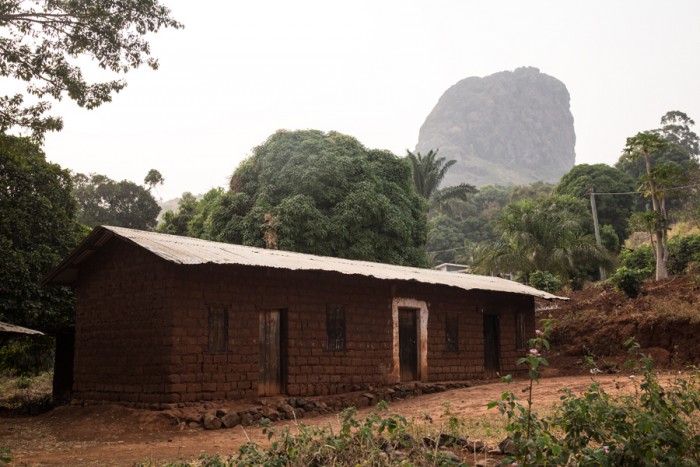
Last Sunday, I took an almost six hours round-trip to Small Babanki, a town just outside of Bamenda, to present HIV Prevention to another group of persons with disabilities. At the presentation, one woman asked, “At what age is the limit for women to have sex?”
“Until when they die,” I responded.
“AH!” the woman squealed.
“In fact, there are reports saying that some people who have sex at 70 years old or older enjoy it more than when they’re younger,” I added.
The woman widened her eyes and said, “Whoooo!”
Later on in the presentation, the same woman asked, “Once you stop having sex, do you become sick?”
“No,” I said.
Half of the participants at the workshop said they have never learned about HIV. When I asked them what are the causes of HIV, many shared that they believed that one can get HIV by sharing clothes with HIV+ people and also hugging. I had to get that info straight with them by telling them it is not true. At the end of the workshop, I checked with them again to make sure they now understood that it is a myth by asking, “Can you get HIV by sharing clothes with HIV+ people and also hugging people with HIV?”
“No!” They all responded.
“Good.” I responded.
Because half of the participants have received HIV education as one was a participant at the WILD Workshop and two others received education from Heifer, it was expected to see that at least half already had some good knowledge on the pre-test. However, four out of six, did say that HIV can be transmitted through sharing clothes. On the post-test, all except one wrote that it’s false. So, at least most now have an understand that sharing clothes cannot transmit HIV. On the post-test, all six participants except for one scored 100%.
